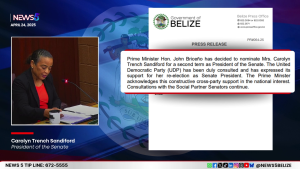Commission Report on Sugar is Disseminated
Commission of Inquiry Report on the Sugar Industry has been handed over to Prime Minister John Briceño. The commission was set up to tackle two main issues: resolving the ongoing conflicts between Belize Sugar Industries and the Belize Sugar Cane Farmers Association and making recommendations to improve the overall sugar industry. Today, we spoke with Lead Coordinator Hugh O’Brien, who mentioned that while the parties are still reviewing the two-hundred-page document, he highlighted the main points of contention. He noted that the Prime Minister has agreed to share the report with the key stakeholders, including the four cane farmers associations, B.S.I., and Santander. O’Brien described the process as intense but said the report contains some solid recommendations. He shared the main points that justified the inquiry.
Hugh O’Brien, Lead Coordinator, Commission of Inquiry
“One of them is the stevedoring cost, the port charges, if I can use that. That was settled to a large extent – my involvement of having compared the two ports and I provided a very detailed report on the costings. The second one is a manufacturing allowance, which is one-fifty Belize per ton for local white sugar, and it’s one-sixty per ton for direct consumption sugars that are exported to Caribbean countries and to Europe and the B.S.C.F.A. in particular has questioned those charges. And so the request, was that a breakdown of how you arrive at those charges or what’s the cost to produce the sugar and to get it to that point – white sugar for the local market, DC sugar for the regional and international market. So that there could have been a verification if the cost that B.S.I. was saying is that what they’re charging is correct or if the charge was too high for that matter to help in coming to a better agreement between the parties – between the B.S.C.F.A. in particular and B.S.I. And then there was also the matter of ocean freight, bagging and those charges as well, because even though those are small, they’re smaller cost, and then there’s ocean freight. So those are the four main groups of charges. One is the port charges, which has been addressed, like I said by my report. Two, the manufacturing allowance, three, the bagging and local handling cost – getting the product from the factory to the port. And then fourth was the ocean freight. Those are the four charges that cause for us to have protests and discontent in the industry. And since those are costs that are deductible from the value of the sugar that is exported, it in the sense then determines how much remains to be shared between the farmers and B.S.I. when those deductions are made.”







Facebook Comments